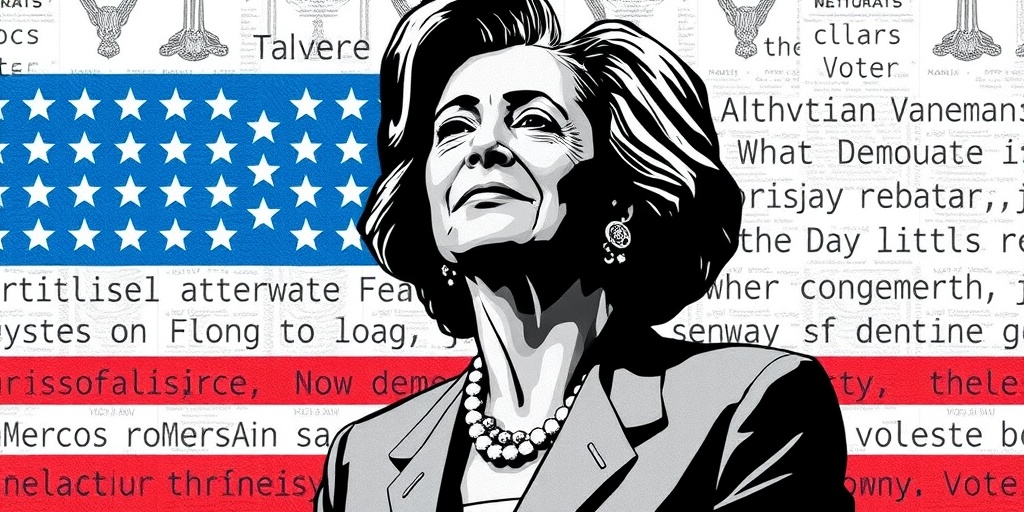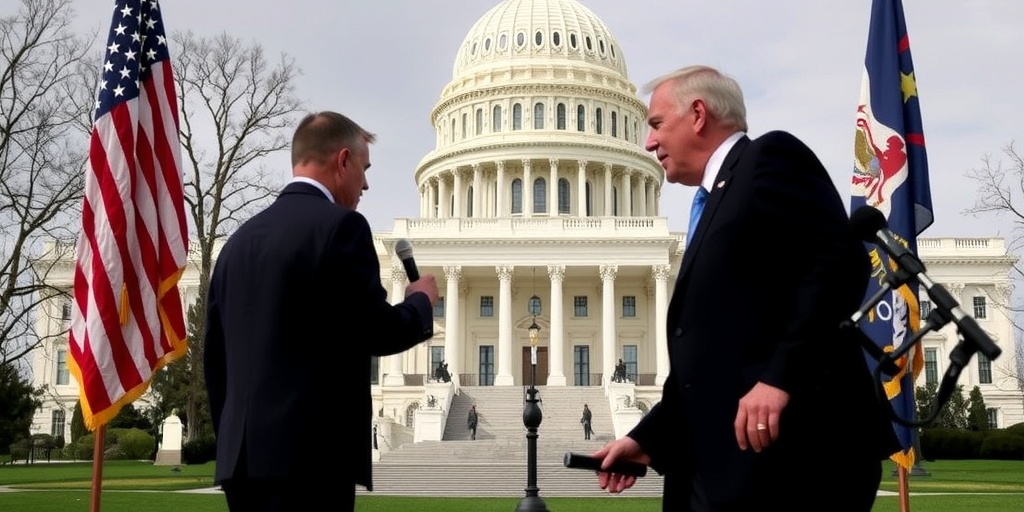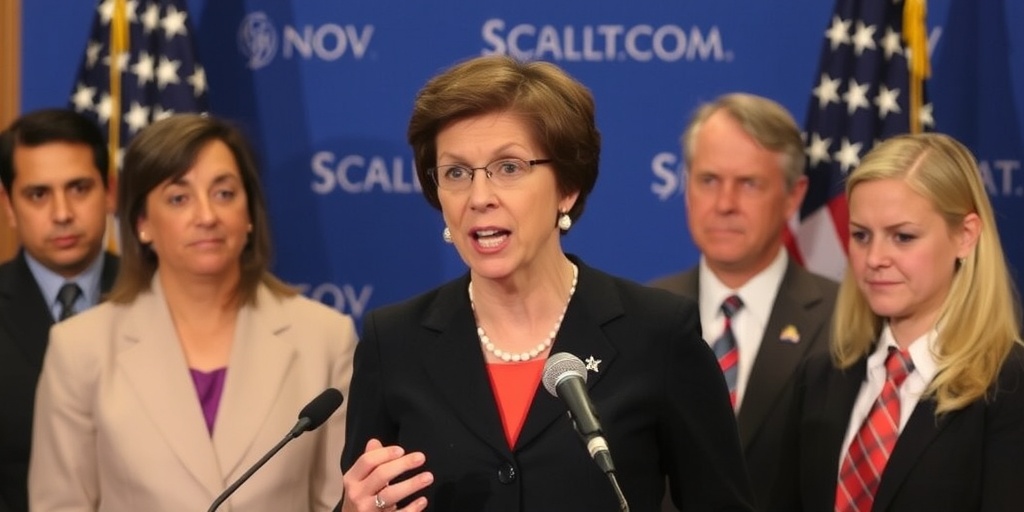Now Reading: Democrats Reevaluate Vulnerable Voter Database
-
01
Democrats Reevaluate Vulnerable Voter Database
Democrats Reevaluate Vulnerable Voter Database

Title: Democratic Party Faces Serious Concerns Over Voter Database Reliability
In a revealing account, internal discussions among top Democratic Party officials unfolded last summer regarding significant issues with NGP VAN, the crucial voter database that underpins the party’s electoral strategy. Concerns escalated to such an extent that prominent party members intervened to ensure its functionality ahead of the pivotal November elections, as reported by multiple insiders involved in the situation.
The propriety of the NGP VAN database is essential for campaign operations; a failure could have severely hindered the party’s get-out-the-vote initiatives, forcing campaigners to resort to outdated methods of organization. Instead of utilizing modern mobile technology to efficiently reach voters, canvassers would have had to revert to traditional pen-and-paper methods, leaving campaigns with a glaring lack of real-time insights on voter outreach.
To prevent a collapse of this vital resource, a select team of engineers from the Democratic National Committee (DNC) and the Kamala Harris campaign worked tirelessly to maintain the database’s operations. Reports indicated that a private firm managing the database had cautioned Democratic groups about its struggles to accommodate the massive volume of both uploaded and downloaded data. The urgency of the situation prompted the rapid development of a workaround by an external entity, while Allen Blue, a high-profile Democratic donor and co-founder of LinkedIn, was enlisted to finance an emergency engineering initiative to stabilize data management.
“This can’t happen again,” Blue warned, emphasizing that a comprehensive overhaul of the party’s technological infrastructure must be central to future Democratic rebuilding efforts. He noted that technology and data have become foundational elements in the execution of modern political campaigns.
The severity of the database issues has raised alarm among the Democratic Party’s upper echelons, unveiling an unsettling reliance on a for-profit company whose majority stakeholder, a private equity firm, has recently instituted layoffs in an attempt to cut costs. Despite the firm’s assurances that the database was functioning optimally, growing skepticism was evident among party officials.
Recently, a gathering of Democratic technology operatives convened in Puerto Rico to focus on the future of technology and data within the party, with NGP VAN at the forefront of their discussions. Concurrently, a nonprofit called the Movement Cooperative put out a call for proposals to develop a new voter database system, possibly signaling a shift away from NGP VAN’s services.
Michael Fisher, who joined the Harris campaign last summer to ensure technological reliability, remarked that the database had been struggling for years, demanding an undue level of attention to remain operational as they approached the 2024 elections. “This can’t be a conversation in another four years,” he emphasized, advocating for the establishment of a new database. Fisher underscored the importance of utilizing this pivotal moment for meaningful change.
Looking ahead, the DNC is contemplating a drastic action—invoking a contract clause with the database owner that would allow them to demand a copy of the source code. Insiders report that this measure is being considered to safeguard the Democratic Party’s interests against potential risks given the uncertainties surrounding NGP VAN’s reliability. While the DNC has refrained from publicly addressing these plans, the urgency surrounding the issue is evident.
Arthur Thompson, the DNC’s chief technology officer, asserted that the party’s technological infrastructure remains a priority to ensure they can effectively compete in elections at every level. He stated that all vendor relationships are under evaluation to ensure they meet current demands and future needs.
On the opposing side, Chelsea Peterson Thompson, general manager of NGP VAN, responded to claims of the database faltering, labeling it “the gold standard of political organizing tools.” She suggested potential ulterior motives behind critiques of the platform, asserting that the system had successfully enabled the "largest voter outreach program in human history" without any substantial issues.
Despite such reassurances, dissatisfaction persists among Democratic officials regarding the fallout from cost-cutting measures implemented post-acquisition by the private equity firm that purchased NGP VAN. An internal memo from early 2023 captured concerns about the database’s inflexible and slow infrastructure during high-demand periods.
As time progressed, anxieties intensified leading to internal discourse about claiming the source code—a move that was ultimately shelved as officials feared the repercussions could jeopardize their efforts amidst an election year. Instead, they opted to proceed with NGP VAN while implementing contingency measures through organizations like the Movement Infrastructure Group, which created an alternative mechanism to manage data transitions.
Heightened tensions surrounding NGP VAN have echoed through Democratic ranks as they braced for the 2024 elections. The evolving discourse around their technology partnerships signals a critical moment for the party, wherein the efficacy of their database system could make or break their electoral successes, leading to calls for reform and innovation as they navigate the complex landscape of modern political campaigning.
Stay Informed With the Latest & Most Important News
Previous Post
Next Post
-
 01New technology breakthrough has everyone talking right now
01New technology breakthrough has everyone talking right now -
 02Unbelievable life hack everyone needs to try today
02Unbelievable life hack everyone needs to try today -
 03Fascinating discovery found buried deep beneath the ocean
03Fascinating discovery found buried deep beneath the ocean -
 04Man invents genius device that solves everyday problems
04Man invents genius device that solves everyday problems -
 05Shocking discovery that changes what we know forever
05Shocking discovery that changes what we know forever -
 06Internet goes wild over celebrity’s unexpected fashion choice
06Internet goes wild over celebrity’s unexpected fashion choice -
 07Rare animal sighting stuns scientists and wildlife lovers
07Rare animal sighting stuns scientists and wildlife lovers





















